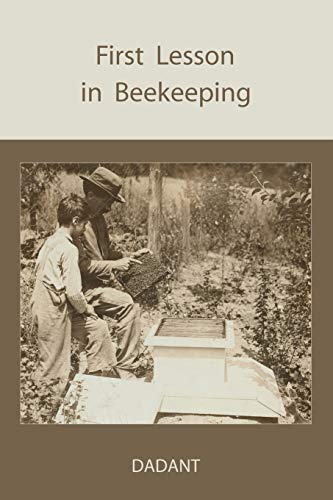
Synopsis
2009 Reprint of original 1934 edition. Paperback, 171pp. The Dadant family, originally from France, is one the first families of beekeeping in America. Charles Dadant (1817-1902) is considered one of the founding fathers of modern beekeeping. He was always seeking a better way to keep bees. Just as he had begun with the old European "eke", he quickly abandoned that kind of beekeeping for the modern Langstroth hive concept. Bee hives have often been designed and built without regard for the needs and habits of the honey bee colony. Probably the best design for a colony was the large hive developed by Charles Dadant. It provided a large, deep brood chamber with plenty of room in which the queen could lay, and shallower supers for honey storage. However, the price and promotion of smaller hives offered for sale during the period from about 1885 to 1900 made them more popular. Charles son, Camille Pierre Dadant, authored First Lessons in Beekeeping, a standard and still important work on this subject. Dadant's book and its succeeding editions have been America's first stop for beginning beekeepers for over 90 years. Lavishing illustrated with photographs.
Les informations fournies dans la section « Synopsis » peuvent faire référence à une autre édition de ce titre.
Présentation de l'éditeur
This book was originally published prior to 1923, and represents a reproduction of an important historical work, maintaining the same format as the original work. While some publishers have opted to apply OCR (optical character recognition) technology to the process, we believe this leads to sub-optimal results (frequent typographical errors, strange characters and confusing formatting) and does not adequately preserve the historical character of the original artifact. We believe this work is culturally important in its original archival form. While we strive to adequately clean and digitally enhance the original work, there are occasionally instances where imperfections such as blurred or missing pages, poor pictures or errant marks may have been introduced due to either the quality of the original work or the scanning process itself. Despite these occasional imperfections, we have brought it back into print as part of our ongoing global book preservation commitment, providing customers with access to the best possible historical reprints. We appreciate your understanding of these occasional imperfections, and sincerely hope you enjoy seeing the book in a format as close as possible to that intended by the original publisher.
Présentation de l'éditeur
First Lessons in Beekeeping, first published in 1917 and revised in 1957, remains a classic introduction to the art and science of beekeeping. Written by Camille Pierre Dadant, the son of Charles Dadant (considered one of the fathers of modern beekeeping), the book's chapters include: Beekeeping As An Occupation; How The Colony Is Organized; The Complete Hive; Accessory Equipment; Establishing The Colony; Spring In the Apiary; Summer In The Apiary; Fall And Winter Preparation; Queen Management; Diseases And Enemies; Honey Plants; and Packing Honey For Market. Illustrated with b/w photographs. Although the book lacks descriptions of recent diseases and insect pests of honeybees, the basic principles of apiary management outlined in First Lessons in Beekeeping make the book a invaluable introduction to beekeeping.
Les informations fournies dans la section « A propos du livre » peuvent faire référence à une autre édition de ce titre.
Autres éditions populaires du même titre
Résultats de recherche pour First Lessons in Beekeeping
First Lessons in Beekeeping
Vendeur : Else Fine Booksellers, Tacoma, WA, Etats-Unis
Soft cover. Etat : Very Good. Facsimile of the 1934 10th edition. Light shelf wear, previous owner's name inside front cover. N° de réf. du vendeur 008449
Acheter D'occasion
Expédition nationale : Etats-Unis
Quantité disponible : 1 disponible(s)
FIRST LESSONS IN BEEKEEPING.
Vendeur : PASCALE'S BOOKS, NORTH READING, MA, Etats-Unis
Soft Cover. Etat : Fine. 167 pages, illustrated in b&w. This book is a reprint of the tenth edition from 1934. "This treatise for beginners is an entirely rewritten edition of the now exhausted book published in 1911 by George W. York and Co." FINE SOFTCOVER Size: 8vo - over 7¾" - 9¾" tall. N° de réf. du vendeur 036243
Acheter D'occasion
Expédition nationale : Etats-Unis
Quantité disponible : 1 disponible(s)


